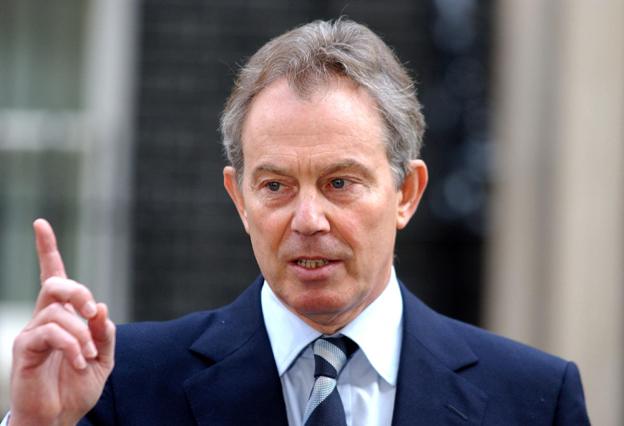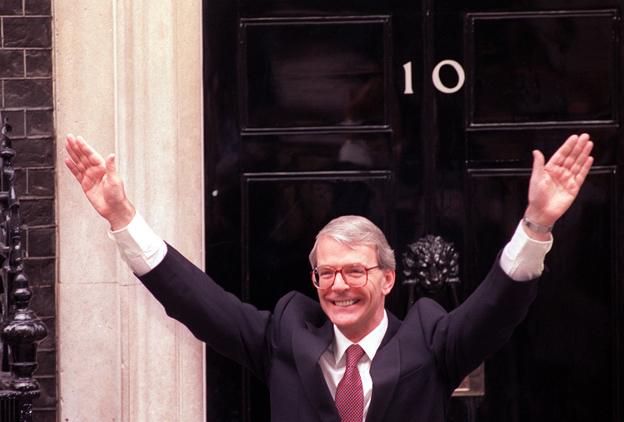How the Civil Service objected to Kinnock's FOI plans
- Published
- comments
Civil Service plans for a Neil Kinnock-led government in 1992 are revealed by a BBC Freedom of Information request
Documents obtained by the BBC reveal how Whitehall officials wanted to weaken the freedom of information plans that Neil Kinnock would have introduced if he had become prime minister.
They are part of the briefing pack that civil servants had prepared to give to Lord Kinnock (as he now is) if Labour under his leadership had won the 1992 general election.
According to the documents FOI appears to be the only area of policy where Downing Street officials intended to raise objections to Labour proposals.
The papers show the civil service would have advised him to ensure that anyone applying for information should have to pay a charge. They argued that "a structure of fees" would make an FOI law "more manageable and practicable".
This is one of a number of changes that officials would have recommended to the more far-reaching FOI scheme Labour had put forward in opposition. The civil service wanted greater confidentiality for a wide range of information, relating for example to policy advice, cabinet discussions, the security services, economic forecasts, honours, judicial appointments, law enforcement and legal advice.
Lord Kinnock himself had not seen these papers until the BBC showed them to him, and he says he is not surprised by the contents: "These are absolutely outstanding civil servants, very fine minds and scrupulously fair, but they couldn't avoid filling up a paper with the disadvantages of FOI. Their objections are legalistic, but I know that hidden within that code could have been, 'Listen lads, this is a good way to bugger up FOI.' Fortunately we've got a pretty comprehensive FOI law now."
'Utterly undermining'
The Freedom of Information Act eventually introduced, after Labour won the next election under Tony Blair in 1997, reflects some of these Whitehall concerns, although significantly it does not require payments for information requests.
Mr Blair later regretted his introduction of FOI, writing in his memoirs: "I used to say - more than a little unfairly - to any civil servant who would listen: Where was Sir Humphrey when I needed him? ... How could you, knowing what you know, have allowed us to do such a thing so utterly undermining of sensible government?"

Tony Blair later "regretted" introducing the FOI Act
Maybe this suggests that back in 1992 Sir Humphrey would have done a better job of fulfilling the duty Mr Blair expected. The FOI briefing for Lord Kinnock was signed by the then Cabinet Secretary, Robin Butler, who was still in post when Mr Blair was elected.
These records have been revealed now to the BBC - ironically perhaps under freedom of information - following a dispute which has lasted nearly two years. I requested the documents back in November 2012. This was turned down by the Cabinet Office, and their refusal was largely upheld by the Information Commissioner. I then appealed to the Information Rights Tribunal, and the Cabinet Office eventually released the bulk of the documentation, with the last portion sent just three weeks before the scheduled tribunal hearing.
'Ridiculous'
The Cabinet Office had previously argued that releasing the papers, even though they are over 20 years old, would inhibit civil servants from providing frank advice in future. It maintained: "Incoming ministers, including the prime minister, as a result would be less well briefed at a critical time for any government."
"This is a ridiculous bit of Whitehall doctrine that the information commissioner swallowed," says Maurice Frankel of the Campaign for Freedom of Information. "They got it past the commissioner, but it's obvious they wouldn't get it past the tribunal."
Lord Kinnock was not consulted about the release of the material and has no objection to its publication. "In terms of the well-being of the state it's harmless, but for scholars it's interesting. It conveys an idea of how this extraordinary machinery works at a change of government."
The briefings include advice on policy, procedural guidance on appointing ministers, background information on the workings of Downing Street, and a list of issues needing early decisions. Much of the policy discussion was based on the officials' detailed analysis of the implications of the Labour party manifesto, external. Lord Kinnock's staff also had meetings with civil servants as the election approached, although he did not personally.

John Major won the 1992 election with a small majority
While in fact John Major remained prime minister in 1992 with a small Conservative majority, a Labour victory had seemed a plausible possibility to many in the run up to the election, in line with much of the opinion polling.
One intriguing document is the draft Queen's speech that the monarch would have delivered if a Labour government had been formed. This includes the statement: "My government are committed to the Exchange Rate Mechanism and will in due course move sterling to the narrow bands at the current parity of 2.95 Deutschmarks".
Calamity
This was just a few months before overwhelming pressure from the financial markets dramatically forced the UK out of the ERM, which linked European currencies - an ignominious and chaotic political disaster from which the Major government never really recovered.
Lord Kinnock has since stated that he would have avoided this calamity, as he had a secret plan he would have implemented immediately after winning power, to seek to devalue the pound within the ERM. A lower rate of about 2.6 DM might then have turned out to be sustainable.
The draft speech confirms that he did indeed keep this crucial intention secret from the officials he would have been working with, and they also never suspected it.
Other documents in those released shed light on internal Whitehall turf wars. One argued that it was a good idea for prime ministers to have their own foreign affairs policy adviser independent of the Foreign and Commonwealth Office, so that "FCO recommendations are tested against an independent standard before being approved".
The papers also dealt with the sensitive subject of the presentation of devolution policy, suggesting that "it would look right politically, particularly north of the border" for the Secretary of State for Scotland to take charge of this area, but noted that this could annoy some "in English regions, who might resent the special position being given to Scotland".
'Bun-fight'
Some of the material warned about the additional financial costs of becoming prime minister, from staff presents to personal appearance: "You will spend a lot more on clothes than if you were a private citizen. Mrs Kinnock likewise, especially for formal occasions." The civil service encouraged him to take his full salary, in contrast to Margaret Thatcher's earlier example.

Lord Kinnock is amused by this. "I only ever wear Marks and Sparks anyway, and that would have continued," he says. "And because Jaeger then had a Labour-supporting chairman, my wife got 25% off there."
The documents also reveal how Downing Street officials took a sceptical view of some major international political gatherings.
They warned that the United Nations Conference on Environment and Development (UNCED), external, the 1992 global environmental summit in Rio de Janeiro, "will be a bun-fight". And a briefing about the forthcoming UN general assembly outlined the role to be played by the European Community (as the European Union was then called), explaining that "The EC speech has to be an agreed text and is usually long and boring".
- Published10 April 2014
- Published3 February 2014